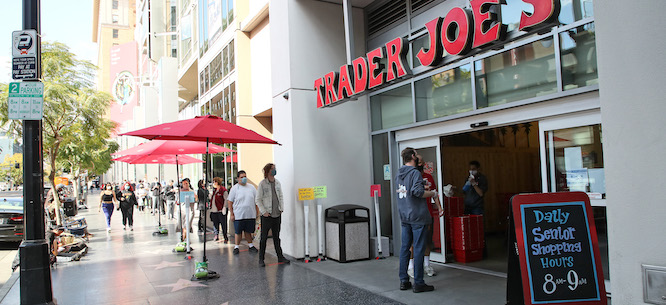Sales Over Health and Safety at Trader Joe’s
Sales Over Health and Safety at Trader Joe’s
Grocery workers say they are encouraged to overcrowd stores—while their CEO writes that unionization is against the chain’s “values.”

[contentblock id=coronavirus]
With several hundred stores and about 10,000 employees nationwide, Trader Joe’s is a supermarket giant that fronts as a local hipster grocery store, famous for its quirky brand image and the bouncy team spirit of its staff. But as COVID-19 creeps into its stores, workers are worried that the management is going too far out of its way to make its customers feel at home, sometimes at the expense of workers’ health.
Sam (Dissent has changed all names in this piece to protect concerned workers from possible retaliation), an employee at a Trader Joe’s in Los Angeles, recalled that in the early days of the pandemic response, workers were actively discouraged from wearing gloves and masks, because the management feared it would alarm customers to see their workers wearing personal protective equipment (PPE).
Sam said that prior to the COVID-19 crisis, some checkout workers had generally been allowed to wear gloves if they wanted to. But when the pandemic started raising concerns about wearing masks and gloves as a health precaution, “They were specifically pulled out and taken outside and [told], ‘You guys can’t be wearing gloves, it makes the customers uncomfortable.’ So I think at that point, Trader Joe’s had taken this stance that PPE was not necessary for us. Even if it made employees comfortable, it was something that made shoppers uncomfortable.”
In the following weeks, Trader Joe’s responded to the escalating public health warnings by beefing up its safety guidelines. A section of its website outlines the company’s COVID-19 policies, including providing employees with masks and gloves, conducting “wellness checks” on staff, operating on a reduced schedule to minimize exposure, intensifying cleaning of stores, encouraging “good hygiene” among workers, and offering two dollars an hour in extra “thank you pay” (the raise, according to a company spokesperson, is currently being extended indefinitely).
Despite those safeguards, the main issue at Sam’s store is simply overcrowding. Sam’s coworker, Lee, recalled that, initially, there were tighter restrictions on how many people could be admitted into the store. The manager capped customers at about twenty-five to thirty-five—enough to maintain a safe distance. But in late April, Lee said, the regional manager intervened and “pretty much directed every store in our region to allow, I’d say, probably fifty-five to sixty-five people in our store now. That’s a number that I know all of us, as employees, are extremely uncomfortable with, and it’s been like that ever since.”
Sam said the management has also tried to avoid the snaking lines that have appeared outside other supermarkets during the crisis, wary that “if customers see a line outside, they are more likely not to shop. Their directive now has been to decrease the look of the line and flood the inside of the stores [instead].”
Meanwhile, Sam added, the implementation of the company’s guidelines is left largely to individual store managers or regional managers. The result is that the safety protocols at each store are “based off of the personal or political beliefs of whoever we’re working under.” Sam is also frustrated that customers are often allowed to roam the store without masks, despite the fact that wearing a face covering has been mandated in Los Angeles: “Trader Joe’s has said several times—they always use the same phrase—‘We’re not the mask police. So we’re not going to enforce it if somebody doesn’t want to come in with a mask.’”
Lee recalled one particularly rebellious customer who refused to wear a mask, following a trend of protesters at various businesses brazenly defying mask-wearing and social distancing rules, but was allowed in anyway: “He felt like it was infringing on his freedoms, as an American, because he doesn’t want to wear a mask,” Lee said. But having to accommodate some shoppers’ ideological resistance to basic safety standards “just puts all of the employees, and the other customers that are shopping there, at risk. . . . It just feels like [the management] would rather risk all the other customers’ and employees’ health and safety to get that one extra sale.”
There is one visitor that Trader Joe’s is eager to keep out: organized labor. Since early March, a campaign to formally unionize the workforce in some stores has been building momentum, seizing on COVID-19 as an opportunity to press the company on improving workplace safety conditions.
Trader Joe’s is trying to convince workers that unionization would undermine the company’s “Values.” In late March, CEO Dan Bane wrote a letter to all employees denouncing the union drive as “a distraction” led by activists seeking to “create some sort of wedge in our company through which they can drive discontent.”
Sam noted that there is, for now, no active campaign to unionize their store. There is plenty of discontent, however. Workers are distressed that their pleas for tighter safety enforcement have gone ignored by their manager:
They don’t ever really respond to what people are actually saying, and I think that’s the thing that’s just really tipping everybody over the edge, and I’ve seen a lot of my coworkers’ mental health kind of slide downhill, because they’re just constantly making the effort to make their environment safer, and they’re just dismissed.
Michelle Chen is a member of Dissent’s editorial board and co-host of its Belabored podcast.






